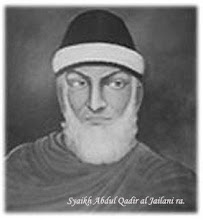as important a role in Sufi teachings as love. Historians have
commonly spoken of a gradual development of Sufism that
begins in a mysticism of asceticism and fear, slowly changes to
an emphasis on love and devotion, and then turns to stressing
knowledge and gnosis. Some have suggested that these three
ways of approaching God correspond with the three basic
Hindu paths – karma yoga, bhakti yoga, and jnana yoga.
Whatever the heuristic value of such schemes, there can be no
doubt that from earliest times Muslims who strove to gain
nearness to God did so through activity, love, and knowledge.
Any close reading of the Koran will make clear that it prefigures
the diverse possibilities of the soul’s unfolding. And any close
reading of Sufi literature will reveal sophisticated insights into
the soul’s complexity at every period.
It might be argued that Islam is built on karma yoga, since
everyone without exception must observe the Sharia, which
sets down the path of conforming to God’s will through activity.
One can also argue that Muslims and Sufis stress jnana yoga,
because, generally speaking, they place a higher value on knowledge
than do Jews or Christians. Nonetheless, Sufism gives a
certain pride of place to love. In what follows, I want to make a
few brief suggestions as to the significance of love as expressed
in the two great watersheds of the tradition, Rumi and Ibn
Arabi. I do not wish to suggest that either neglected the paths of
knowledge and activity, and indeed, in the case of Ibn Arabi, a
strong argument can be made that he gave priority to knowledge.
Rather, I simply want to bring out the basic Sufi under-standing of love’s reality, given that love is so often the central concern of the texts. Although love is rarely emphasized in the earliest expressions of Sufism, the Koran speaks of love in a number of key verses that clarify its essential role. We have already discussed one of these verses, which tells us that God’s love for people grows up in keeping with their success in conforming themselves to the Prophet’s example. Although this verse speaks of love for God as a precondition for receiving God’s love in return, all the great lovers recognized that what stirs up love for God in the first place is God’s love for human beings.
People could not love God if He did not already love them. The Hadith of the Hidden Treasure makes precisely this point – God created people out of love for them. The most often cited Koranic proof text for this hierarchy of love is the verse, “He loves them, and they love Him” (5:54). First God loves human beings, then human beings love God. Once they come to love Him, His love for them will increase to the extent that they follow the Prophet, purify and cultivate their souls, remember God ceaselessly, and become perfect human beings.
Whether or not love is mentioned, the earliest expressions of Sufism’s reality tend to take the form of pithy sayings touching on a great variety of topics having to do with the path to God. Two or three figures appear who are looked back upon as exemplars of the life of love, like Rabi’a and Hallaj. But from the eleventh to the thirteenth centuries – the fifth to the seventh Islamic centuries – a number of extremely important authors appear who map out a detailed psychology of love.
The famous Ghazali sometimes writes about human and divine love, but his less well-known brother, Ahmad Ghazali (d. 1126), devotes most of his relatively short Persian work, Sawanih, to love as the underlying, unitive reality of the soul. This work then provides inspiration for dozens of later treatises. Ahmad’s disciple Ayn al-Qudat Hamadani (d. 1131) played an important role in formulating a psychology and metaphysics of love. Perhaps most profound and original in approach – in a period of many great masters – was Ahmad Sam’ani (d. 1140), even though he has remained almost completely unknown to modern scholars.
Somewhat later appeared the great Persian poet Attar (d. 1221), whose works mapped out all the themes of love. Despite the large number of authors who wrote on divine and human love, Ibn Arabi and Rumi can be considered the two greatest masters of the tradition. Ibn Arabi was born in Murcia in Spain and died in Damascus in 1240. He wrote prolifically in Arabic and came to be considered the foremost Sufi theologian and philosopher. In later centuries, his name became almost synonymous with the expression wahdat al-wujud, “the Unity of Being,” a doctrine that was often taken as encapsulating his perspective. He composed more than five hundred prose works, some of them enormously long. He also wrote something like twenty thousand verses of poetry.
His younger contemporary, Rumi, was born in Baikh in present-day Afghanistan and moved in his youth to Anatolia, eventually settling in Konya in present-day Turkey, where he died in 1273. He composed about sixty-five thousand verses of breathtaking Persian poetry along with three short prose works. The Persianate world, from Turkey to India, looks back upon Rumi as the greatest spiritual poet of history, just as the whole Islamic world considers Ibn Arabi the greatest Sufi theoretician.
Ibn Arabi and Rumi belong to two different strands of Sufism. Each in his own way marks the high point of the tradition. Most formulations of Sufi teachings after them are inspired to some degree by the writings of one or both. Their perspectives differed in many ways, but they also share numerous common themes, especially on the issue of love. In what follows, I will illustrate how Ibn Arabi explains something of love’s reality and offer a few appropriate examples of Rumi’s poetical expressions of the same ideas.
From Sufism - A Beginner Guide
People could not love God if He did not already love them. The Hadith of the Hidden Treasure makes precisely this point – God created people out of love for them. The most often cited Koranic proof text for this hierarchy of love is the verse, “He loves them, and they love Him” (5:54). First God loves human beings, then human beings love God. Once they come to love Him, His love for them will increase to the extent that they follow the Prophet, purify and cultivate their souls, remember God ceaselessly, and become perfect human beings.
Whether or not love is mentioned, the earliest expressions of Sufism’s reality tend to take the form of pithy sayings touching on a great variety of topics having to do with the path to God. Two or three figures appear who are looked back upon as exemplars of the life of love, like Rabi’a and Hallaj. But from the eleventh to the thirteenth centuries – the fifth to the seventh Islamic centuries – a number of extremely important authors appear who map out a detailed psychology of love.
The famous Ghazali sometimes writes about human and divine love, but his less well-known brother, Ahmad Ghazali (d. 1126), devotes most of his relatively short Persian work, Sawanih, to love as the underlying, unitive reality of the soul. This work then provides inspiration for dozens of later treatises. Ahmad’s disciple Ayn al-Qudat Hamadani (d. 1131) played an important role in formulating a psychology and metaphysics of love. Perhaps most profound and original in approach – in a period of many great masters – was Ahmad Sam’ani (d. 1140), even though he has remained almost completely unknown to modern scholars.
Somewhat later appeared the great Persian poet Attar (d. 1221), whose works mapped out all the themes of love. Despite the large number of authors who wrote on divine and human love, Ibn Arabi and Rumi can be considered the two greatest masters of the tradition. Ibn Arabi was born in Murcia in Spain and died in Damascus in 1240. He wrote prolifically in Arabic and came to be considered the foremost Sufi theologian and philosopher. In later centuries, his name became almost synonymous with the expression wahdat al-wujud, “the Unity of Being,” a doctrine that was often taken as encapsulating his perspective. He composed more than five hundred prose works, some of them enormously long. He also wrote something like twenty thousand verses of poetry.
His younger contemporary, Rumi, was born in Baikh in present-day Afghanistan and moved in his youth to Anatolia, eventually settling in Konya in present-day Turkey, where he died in 1273. He composed about sixty-five thousand verses of breathtaking Persian poetry along with three short prose works. The Persianate world, from Turkey to India, looks back upon Rumi as the greatest spiritual poet of history, just as the whole Islamic world considers Ibn Arabi the greatest Sufi theoretician.
Ibn Arabi and Rumi belong to two different strands of Sufism. Each in his own way marks the high point of the tradition. Most formulations of Sufi teachings after them are inspired to some degree by the writings of one or both. Their perspectives differed in many ways, but they also share numerous common themes, especially on the issue of love. In what follows, I will illustrate how Ibn Arabi explains something of love’s reality and offer a few appropriate examples of Rumi’s poetical expressions of the same ideas.
From Sufism - A Beginner Guide










Ya Haqq
ReplyDeleteGreat site. I look forward to learning more about Hasan wa Husein. I really liked your post oin Dhikr and I look forward to reading a lot more of your site in the near future. I am adding you to my blog roll on my blogs.
Peace and Blessing to You
Dave
Mashallah!
ReplyDeleteBeautiful website in unfolding. will look forward to come back and learn from here and share with my readers as well.
Much blessings.
Alhamdulillah
ReplyDeleteWith pleasure brothers,
Wish Allah still give me power by the barakah of the sufi silsila of Hasan wa Husein, to spread the beautiful and uniqueness of sufism.
Ma'asalamah